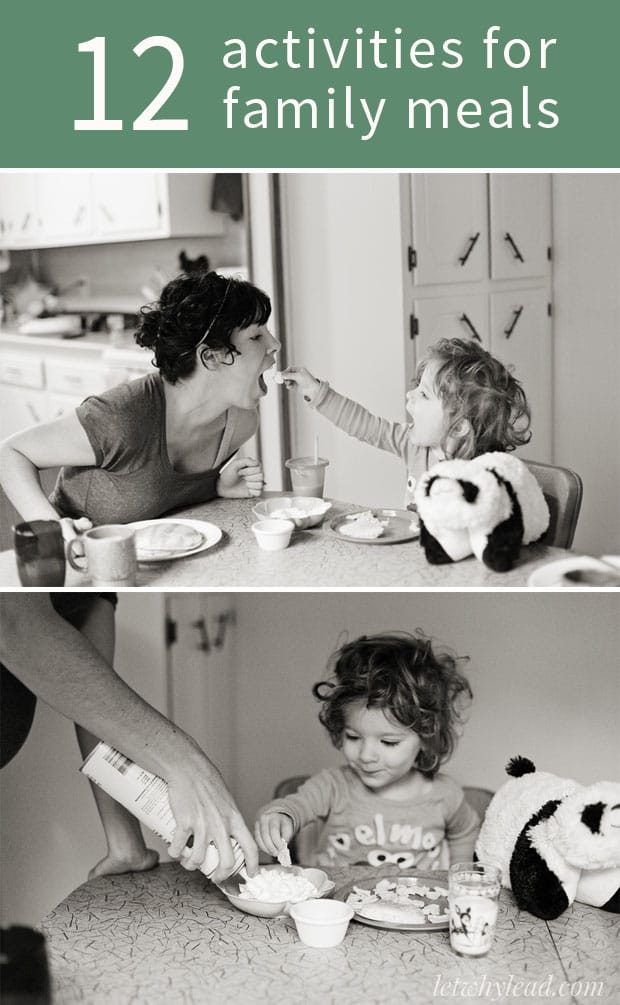If you remember from when I shared some easy alternatives to family dinner, my husband and I have mixed feelings about family meals. (And by mixed, I mean my husband wouldn’t mind bagging it for a few more years…)
So when we do sit down at the dinner table, I want our time to count. 🙂
With his own kids, Bruce Feiler of The Secrets of Happy Families aims for just ten minutes of quality talk per meal, with the kids talking for at least half of it. And the way I see it, if we’re going to go to the effort of serving up dinner and refilling a hundred cups, we might as well pack in some added benefit!

12 Activities for Family Meals
For a printable version, click here!
To Build Sense of Self
Autobiography Night
Ask each child to recall an experience, and then follow up with opened-ended (who, what, when, where, why) questions. Boston researchers found that children who were encouraged to reminisce retained memories better than those who weren’t. Memories also translate to self-esteem, which makes me smile even more when my son talks about the cooked carrot we tried to put on a snowman when he was two years old.
The Happy Sad Game
Have everyone at the table share one sad and one happy thing that happened to them that day. I love that this gives kids a chance to see their parents and siblings work through hard things. Feiler says this simple exercise helps children develop “empathy and solidarity with those around them.” Beautiful.
The Dinner Guest Game
If you could bring one person, past or present, to dinner, who would it be, and why?
To Build Family Identity
The “Do You Know Me?” Game. Have the kids ask questions about themselves (What is my favorite food? What do I do at recess?), and then have them answer questions about YOU (What town did I grow up in? What is my favorite book?). I love the idea of showing our children that it takes effort and thoughtfulness to really know another person.
Service Suppers. I recently heard one mom say that to combat some characteristics of the current “selfie generation,” she has her teenage children share one thing they did that day to serve someone else. What a great way to encourage children to look outside of themselves as a habit.
An Attitude of Gratitude. Ask: What is one thing you are grateful for today? We’ve done this a lot lately, and I’m often touched by the range of blessings we share in one sitting, from a deep love for grandparents and family legacy to my son’s appreciation for candy. 🙂 If gratitude is a muscle that grows stronger with exercise, I want my children to be bodybuilders!
Pain Point. Come to dinner prepared to share one sore point from your life, and allow your children to brainstorm ways to handle it. (Examples: A neighbor complained about how long you go in between mowing the lawn. You scheduled two appointments for the same time. You want to donate to the PTA, but you’re saving to buy a house.) Brainstorming together encourages problem solving skills and family unity.
Roots. Share a story from your family’s history. This one may break Feiler’s rule of having the kids do at least half the talking, but it’s worth it. If we want family identity to seep into our children’s souls, storytelling is a powerful way to achieve that. (I know it can be hard to think of stories off the top of your head, so try printing some old family photos to use as a springboard for your stories.)
To Build Verbal & Other Skills
Describe Your Day. Have each child describe their day in a few sentences—without using any words that start with a certain letter.
Tough Questions. Throw out a topic, and encourage curiosity by having the kids come up with questions about that topic. The toughest question wins. (Topic ideas: photography, basketball, Broadway, air travel, nocturnal animals.)
Similar Words. Give the kids two dissimilar words and have them brainstorm what’s similar about them.
Human Thesaurus. Toss out a common word (play, quietly, happy) and ask everyone to come up with as many alternatives as possible.
—
Believe me, I know you can’t do this every time you sit down. On the nights when my ears are ringing from the wild laps the boys ran around the table right before dinner, I’m just happy when the food in their mouths has quieted them down.
You also may not have time at dinner for the whole family to share, but if you keep plugging away, I really believe those dinnertime chats will help your kids come to feel like they are a part of something bigger than themselves—your family.
You know I’d love to hear what’s happening at your table! Have you done any of these? Do you have any to add?
Resources:
The Secrets of Happy Families by Bruce Feiler
How to Craft a Family Purpose Statement by Erica Layne





Oh my goodness, Erica, I love these ideas! I have SUCH fantastic memories of conversation around the dinner table. The only thing I would add to your list is being silly. I’m not sure how you can really facilitate that, haha, but in our family it just sort of happened. My poor mom would sit there, quietly eating her dinner while my sisters and my father and I grew increasingly noisy and ridiculous. We had plenty of serious conversation too, but those goofy moments are definitely the ones I remember and cherish the most. 😉
Oh my goodness right back at you, Claire! I was toying with the idea of a followup post about the mood at the table and how to get kids to participate (because my gut thought is that it’s important not to be pushy). Yes, lightheartedness is a must. Now that I think about it, it’s pretty much the answer to any question about getting your kids to participate. If they love hanging out with the family because everyone laughs together, problems solved! Thanks for adding that!
l love that family meal time is important to you. I often find myself not making much conversations, because during the week it’s just me and my three year old and 14 month old. My three year old I often ask him what he did that day, even though I know, but I don’t do much talking with my 14 month old who doesn’t talk.
I have had the conversation with my husband about hoping our children have good self esteem so they are able to stand up for good as they get older. I see that children who have that strong self esteem don’t usually fall to peer pressure and such. They believe in themselves and don’t feel the need to impress other people. I want my children to be well rounded and themselves- so I like these suggestions.
Yeah, my kids are 5, 4, and 1, and we’re just getting our feet with with these. I’m excited to do more as they grow, but when they’re really little (like yours), there’s only so much you can do! Just asking about his day is perfect. 🙂
These are some great ideas! I just saw a conversation idea that I thought was clever…2 truths and a fib. Everyone gets to have fun guessing which events are real and which is made up, encourages creativity, gets some events from your child’s day out that might not otherwise.
Yes! I love the idea of doing that within a family – It seems like it would be harder to think up fibs that your siblings and parents don’t already know or couldn’t guess! Fun challenge, for sure!
I love this! We really struggle with kids getting too silly at the table. Messes get made, nobody eats, and we all leave in a bad mood while I start counting down the minutes to bedtime! We go through phases where we do good, bad, funny…each person tells something good that happened that day, something bad that happened, and something silly. The kids love this and it helps keep our dinnertime much more under control! I need to put this list on the fridge so we can try some of them out.
That’s awesome, Sarah! I hadn’t thought about dinner activities being a way to keep hyper kids a little more on point. 🙂 I’m thinking of turning this list into a simple printable – perfect for the fridge!
Wonderful, thoughtful ideas!
Love this!
My kids are older, but I still think games like these are fun to keep the conversation going at the dinner table. Pinned.
These are great ideas! Maybe it will help keep our preschoolers at the dinner table a little longer before they get bored and try to leave. 🙂
Wonderful post! Thanks so much for sharing!!!! Can’t wait to try some of these!!
http://mrscoachsims.blogspot.com
I am printing out this list! Family dinners with little ones are tough. Our kids have goals for dinner time (one each — examples, eat my food myself, try new foods without complaining, stay in my chair) and we are giving them stars as we catch them doing it. It’s helped a little. We have a page of dinner time rules too 🙂 My biggest pet peeve is hearing little ones whine incessantly about the meal I just spent an hour making.
Ugh, Betsy, I know the feeling! It’s times like that that I wish picking kids on my kids once they’re grown. 🙂
Sounds like you guys are being really intention about dinner time. Good for you!
…oh the power of a star!
Great idea Erica. Reminds me of a great book about helping children become deeper thinkers as they read. It is called “7 Keys to Comprehension by Susan Zimmerman. The following is an excerpt from this common sense book:
“GOOD RECTANGLES AND NOT-SO-GOOD RECTANGLES
Let’s talk about rectangles. There are good ones and not-so-good ones. “Rectangles” greatly affect your child’s language development and, ultimately, reading ability. Good
rectangles are the dinner table and books; not-so-good ones are the television set and the computer screen.
Yes, there are worthwhile television programs, and the Internet provides access to a wide range of
information and to people throughout the globe. But children can waste huge blocks of time playing mindless computer games, and you know how much junk is on the tube.
Nielson Media Research reports that the average American child watches about 25 hour of TV a week. [This book was written in 2003.] And that doesn’t include time spent playing video or computer games.
The problem is not so much what children are doing but what they are not doing. They aren’t romping at the playground, making mud pies, painting with finger paints, playing dress-up, building with Legos or blocks, helping you “rearrange” the kitchen cabinets, listening to you read, making up stories, playing Mother, May I? Or Simon Says, reading, making music, getting exercise. They aren’t laughing over the comics, following directions to build a model airplane, or passionately tracking a favorite character into another adventure. Instead, they are sitting passively in front of a television or computer screen. So, what are kids missing in terms of mental exercise and development? They’re missing a great deal, in particular activities that have them organize information, gain understanding, use their imagination and practice their own use of language. They’re missing the joy of reading. They’re not exercising their brains. It’s like perpetually sitting on the sidelines and never getting to play the sport. Bench-warmers never get good at the game.
.)Dinner table chat, in which children and adults come together and talk about their days, ask questions, engage in discussions, laugh together, and enjoy one another’s company, is a kind of family glue, as well as one of the best things you can do to enhance your child’s listening, thinking, speaking and reading abilities. The two “good rectangles” – the dinner table and books – can make a huge difference in your child’s life.
If you are reading interesting stories to your child and if your dinner table is a place where questions are asked, ideas are pondered, good humor is shared and a healthy dose of listening occurs, then the good rectangles in your home will go a long way toward developing your child’s language skills and ultimately her reading ability.
http://schools.dcsdk12.org/education/components/scrapbook/default.php?sectiondetailid=202038&